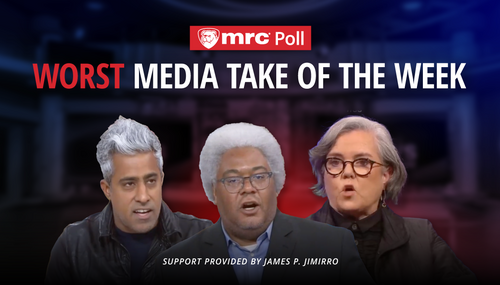As he opened Sunday's Fareed Zakaria GPS on CNN, host Zakaria brought up his background as a secular Muslim as he condemned Donald Trump's "bigotry and demagoguery" in the show's regular "Fareed's Take" segment.
At one point, he seemed to compare himself to secular German Jews who criticized Adolf Hitler in the 1930s as he referred to the diaries of Victor Klemperer and showed archival footage of Hitler inspiring an audience to chant, "Heil!"
Zakaria opened the show:
I think of myself first and foremost as an American. I'm proud of that identity because, as an immigrant, it came to me through deep conviction and hard work, not the accident of birth. I also think of myself as a husband, a father, a guy from India, a journalist, New Yorker, and on good days maybe an intellectual. But in today's political climate, I must embrace another identity. I am a Muslim.
The CNN host referred to multiple Republican candidates as "dividing Americans" as he continued:
Now, I'm not a practicing Muslim. The last time I was in a mosque except as a tourist was decades ago. I'm completely secular in my outlook. But, as I watch the way in which Republican candidates are dividing Americans, I realize that it's important to acknowledge the religion into which I was born. And yet that identity doesn't fully represent me or my views. I am appalled by Donald Trump's bigotry and demagoguery not because I am a Muslim, but because I'm an American.
Zakaria then invoked the era of Nazi Germany:
In his diaries from the 1930s, Victor Klemperer describes how he, a secular, thoroughly assimilated German Jew, despised Hitler. But he tried to convince people that he did so as a German, that it was his German identity that made him see Nazism as a travesty.
[Shows clip of Adolf Hitler shouting "Heil!" repeatedly with audience members chanting "Heil!" repeatedly]
In the end, alas, he was seen solely as a Jew.
After alluding to the civil war in Bosnia in the 1990s that involved Muslims and non-Muslims, Zakaria referred to there being "several Trump-lites among the Republican candidates" as he predicted that Trump's efforts would be unsuccessful:
I remain an optimist. Trump has taken the country by surprise. People don't quite know how to respond to the vague, unworkable proposals. "We have to do something," he says. The phony statistics, the dark insinuations of conspiracies. "There's something we don't know," he says about President Obama. And the naked appeals to people's prejudices. But this is not the 1930s. People from all sides of the spectrum are condemning Trump, though there are several Trump-lites among the Republican candidates.
Below is a complete transcript of the segment from the Sunday, December 13 Fareed Zakaria GPS on CNN:
But first, my take. I think of myself first and foremost as an American. I'm proud of that identity because, as an immigrant, it came to me through deep conviction and hard work, not the accident of birth. I also think of myself as a husband, a father, a guy from India, a journalist, New Yorker, and on good days maybe an intellectual. But in today's political climate, I must embrace another identity. I am a Muslim.
Now, I'm not a practicing Muslim. The last time I was in a mosque except as a tourist was decades ago. I'm completely secular in my outlook. But, as I watch the way in which Republican candidates are dividing Americans, I realize that it's important to acknowledge the religion into which I was born. And yet that identity doesn't fully represent me or my views. I am appalled by Donald Trump's bigotry and demagoguery not because I am a Muslim, but because I'm an American.In his diaries from the 1930s, Victor Klemperer describes how he, a secular, thoroughly assimilated German Jew, despised Hitler. But he tried to convince people that he did so as a German, that it was his German identity that made him see Nazism as a travesty.
[Shows clip of Adolf Hitler shouting "Heil!" repeatedly with audience members chanting "Heil!" repeatedly]
In the end, alas, he was seen solely as a Jew.
This is the real danger of Trump's rhetoric. It forces people who want to assimilate, who see themselves as having multiple identities, into a single box. The effects of this rhetoric have already poisoned the atmosphere. Muslim-Americans are more fearful and will isolate themselves more. The broader community will know them less and trust them less. A downward spiral of segregation will set in.
The tragedy is that, unlike in Europe, Muslims in America are by and large well assimilated. I remember talking to a Moroccan immigrant in Norway last year who had a brother in New York. I asked him how their experiences differed. He said, "Over here, in Norway, I'll always be a Muslim or a Moroccan. But my brother is already an American."
Once you start labeling an entire people by characteristics like race and religion, and then see the whole group as suspect, tensions will build. In a poignant article on Muslim-American soldiers, the Washington Post interviewed Marine Gunnery Sergeant Emir Hadzic, a refugee from Bosnia, who explained how the brutal civil war between religious communities began in the Balkans in the 1990s. Hadzic said, "That's what's scary with [the] things that [Donald Trump is] saying."
"I know how" these "things work when you start whipping up mistrust between your neighbors and friends. ... I've seen them turn on each other."
I remain an optimist. Trump has taken the country by surprise. People don't quite know how to respond to the vague, unworkable proposals. "We have to do something," he says. The phony statistics, the dark insinuations of conspiracies. "There's something we don't know," he says about President Obama. And the naked appeals to people's prejudices. But this is not the 1930s. People from all sides of the spectrum are condemning Trump, though there are several Trump-lites among the Republican candidates.
The country will not stay terrified. Even after San Bernardino, Americans killed by Islamic terrorists on U.S. soil in the 14 years since 9/11 is 45, according to New America. That's an average of three people a year. The number killed in gun homicides this year alone will be around 11,000.
In the end, America will reject this fearmongering and demagoguery as it has in the past. But we're going through an important test of political and moral character. I hope, decades from now, people will look back and ask, "What did you do when Donald Trump proposed religious tests in America?"
For more, go to cnn.com/Fareed and read my Washington Post column from this week.






